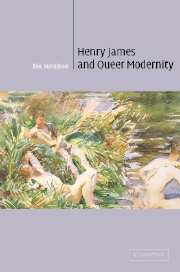Book contents
- Frontmatter
- Contents
- Acknowledgments
- List of abbreviations
- Introduction
- 1 Indiscreet anatomies and protogay aesthetes in Roderick Hudson and The Europeans
- 2 The elusive queerness of “queer comrades”: The Tragic Muse and “The Author of ‘Beltraffio’”
- 3 The Turn of the Screw, or: The Dispossessed Hearts of Little Gentlemen
- 4 Masculinity “changed and queer” in The Ambassadors
- 5 Gratifying “the eternal boy in us all”: Willa Cather, Henry James, and Oscar Wilde
- 6 “The other half is the man”: the queer modern triangle of Gertrude Stein, Ernest Hemingway, and Henry James
- Coda: “Nobody is alike Henry James.” Stein, James, and queer futurity
- Notes
- Bibliography
- Index
5 - Gratifying “the eternal boy in us all”: Willa Cather, Henry James, and Oscar Wilde
Published online by Cambridge University Press: 22 September 2009
- Frontmatter
- Contents
- Acknowledgments
- List of abbreviations
- Introduction
- 1 Indiscreet anatomies and protogay aesthetes in Roderick Hudson and The Europeans
- 2 The elusive queerness of “queer comrades”: The Tragic Muse and “The Author of ‘Beltraffio’”
- 3 The Turn of the Screw, or: The Dispossessed Hearts of Little Gentlemen
- 4 Masculinity “changed and queer” in The Ambassadors
- 5 Gratifying “the eternal boy in us all”: Willa Cather, Henry James, and Oscar Wilde
- 6 “The other half is the man”: the queer modern triangle of Gertrude Stein, Ernest Hemingway, and Henry James
- Coda: “Nobody is alike Henry James.” Stein, James, and queer futurity
- Notes
- Bibliography
- Index
Summary
To begin with a broad brush stroke, Willa Cather shared with Henry James a conflicted, often submerged, and highly self-referential interest in dramatizing the fate of masculinities against the grain, including, by projection, the masculinity distinctively embodied in Cather herself. It is common knowledge, but nonetheless striking, that many of Cather's peers, early and late, remarked on her renegade gender style, and not strictly as a factor of “butch” attire – the succession of smartly unfeminine hats, ties, and shirtwaists familiar from portraits of the author – but also in those less mediated (and more ambiguous) corporeal signifiers of putative queerness that I have been tracing, such as the quality of a “look,” the relative firmness of a hand, or the confident “physical nonchalance” that seemed to index masculinity (and just what else?) in the otherwise female, even feminine, Willa Cather.
Like beauty, however, gender and sexuality have always been in the eye of the beholder – in the eyes of many different beholders, differently empowered and clustered in unstable factions – besides being subject, semiotically, to changes of costumes and props. On this ground alone, one is admonished not to automatically construe Cather's evident gender signifiers as sexual markers (thereby rehearsing the often homophobic moves of the period's sex/gender system) and not to overread the data on her in anachronistic ways.
- Type
- Chapter
- Information
- Henry James and Queer Modernity , pp. 134 - 172Publisher: Cambridge University PressPrint publication year: 2003



